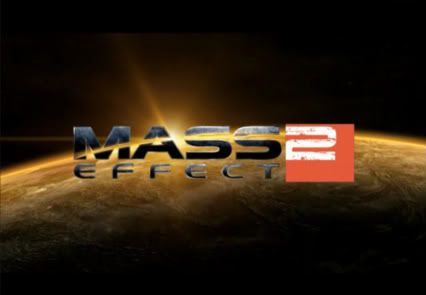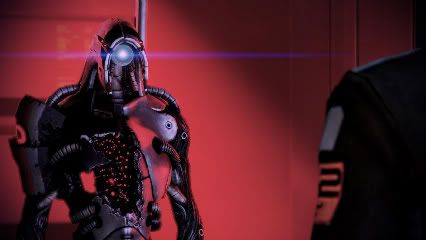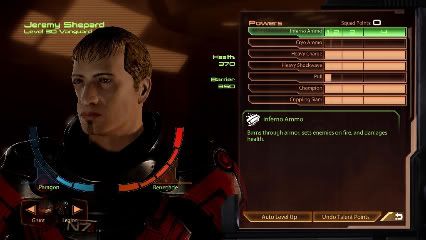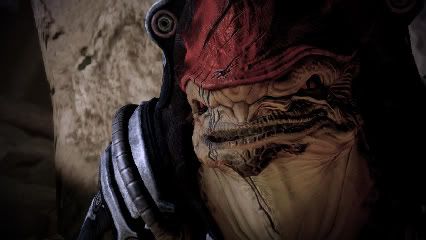 In the first part of this article we looked at some of the ways in which Mass Effect may have fallen flat or disappointed. But in part two we plan to set the record straight, Mass Effect 2 is a fantastic game brimming with good ideas and excellent writing. A few mistakes or missteps along the way don’t change that. As with the previous part of the article, this contains MAJOR SPOILERS, so please only proceed if you’re comfortable with that.
In the first part of this article we looked at some of the ways in which Mass Effect may have fallen flat or disappointed. But in part two we plan to set the record straight, Mass Effect 2 is a fantastic game brimming with good ideas and excellent writing. A few mistakes or missteps along the way don’t change that. As with the previous part of the article, this contains MAJOR SPOILERS, so please only proceed if you’re comfortable with that.
In Part one I mentioned aliens who are like humans, having recognisable human emotions and institutions such as marriage. I decried the lack of mystery and intrigue surrounding Shepard’s team members, which several of you picked up on and disagreed with rather eloquently. But despite my protestations previously, there was always one team member who I felt broke that barrier, or at least chipped away at it.
 His name is Legion and he is my favourite of all the companions in Mass Effect 2 – despite a woeful introductory chat in the AI Core of my ship. As I welcomed him onto my crew with a stilted handshake, I thought ‘Wait.. a handshake, what the hell?’. Even with my friendly Paragon Shepard I expected a bit more caution, perhaps a period of probation before letting someone who looks like my former arch-nemeses the Geth free onto my ship. Niggling doubts too about ret-conning the previous game came up, with the introduction of a second faction of the Geth. But as the game continued, something happened. After every mission or side-quest I’d find myself skipping off down to the AI core, to further delve into Legion’s psyche or programming or… whatever. Legion gives us the opportunity to explore and come to understand a race whom I’d spent close enough to 30 hours blowing up without so much as a ‘Hello’ in the first game. More than that though, Legion is a result of Shepard’s actions. An advanced Geth capable of operating freely, sent out on a recon mission and pretty much allowed to make his own mind up. He is essentially the Geth’s attempt to recreate me, even he can’t satisfactorily explain why he’s wearing an old piece of Shepard’s armour. There’s an eerie intelligence and sense of mystery to Legion. On the mission where you visit the Heretic Geth base and have the choice to blow it up or rewrite them, Legion explains that the programs running through him haven’t yet met a consensus. He leaves the choice up to Shepard and the thought crossed my mind that he was both testing me and gethering (see what I did there) data on me, to better emulate my Shepard. The fact that I was projecting thought processes and trying to second guess my companion is perhaps testament to Bioware’s writing of this particular character. I loved Mordin Solus too, but even his emotional and moral complexity didn’t send shivers up my spine in the way Legion did.
His name is Legion and he is my favourite of all the companions in Mass Effect 2 – despite a woeful introductory chat in the AI Core of my ship. As I welcomed him onto my crew with a stilted handshake, I thought ‘Wait.. a handshake, what the hell?’. Even with my friendly Paragon Shepard I expected a bit more caution, perhaps a period of probation before letting someone who looks like my former arch-nemeses the Geth free onto my ship. Niggling doubts too about ret-conning the previous game came up, with the introduction of a second faction of the Geth. But as the game continued, something happened. After every mission or side-quest I’d find myself skipping off down to the AI core, to further delve into Legion’s psyche or programming or… whatever. Legion gives us the opportunity to explore and come to understand a race whom I’d spent close enough to 30 hours blowing up without so much as a ‘Hello’ in the first game. More than that though, Legion is a result of Shepard’s actions. An advanced Geth capable of operating freely, sent out on a recon mission and pretty much allowed to make his own mind up. He is essentially the Geth’s attempt to recreate me, even he can’t satisfactorily explain why he’s wearing an old piece of Shepard’s armour. There’s an eerie intelligence and sense of mystery to Legion. On the mission where you visit the Heretic Geth base and have the choice to blow it up or rewrite them, Legion explains that the programs running through him haven’t yet met a consensus. He leaves the choice up to Shepard and the thought crossed my mind that he was both testing me and gethering (see what I did there) data on me, to better emulate my Shepard. The fact that I was projecting thought processes and trying to second guess my companion is perhaps testament to Bioware’s writing of this particular character. I loved Mordin Solus too, but even his emotional and moral complexity didn’t send shivers up my spine in the way Legion did.
 Early on in Mass Effect 2 I was worried. I still only had two types of pistol and a pretty basic array of armour. The stats I was allowed to choose between on levelling were sparse and trim, especially compared to the first game. As an RPG fan I’m used to being presented with a diverse array of statistics, abilities, weapons and armour, then finally working out what the hell they all mean about halfway through the game. Not so in Mass Effect 2. As the game progressed, I began to appreciate that simplification doesn’t just mean less choice, but it emphasizes meaningful choice and allows each ability to become a key part of your arsenal. Every point you spend on your character in ME 2 matters, every ability serves a function and every weapon will be used, because of the introduction of ammunition. In Mass Effect combat became repetitive, with the same abilities being levelled and used for every combat. In Mass Effect 2 you’re forced to innovate, combine your attacks and experiment. Team member selection isn’t so much about balancing the right level of tech and biotics as it is selecting the right people for the job. The combat in Mass Effect 2 was dynamic, exciting and varied in ways Mass Effect didn’t even approach.
Early on in Mass Effect 2 I was worried. I still only had two types of pistol and a pretty basic array of armour. The stats I was allowed to choose between on levelling were sparse and trim, especially compared to the first game. As an RPG fan I’m used to being presented with a diverse array of statistics, abilities, weapons and armour, then finally working out what the hell they all mean about halfway through the game. Not so in Mass Effect 2. As the game progressed, I began to appreciate that simplification doesn’t just mean less choice, but it emphasizes meaningful choice and allows each ability to become a key part of your arsenal. Every point you spend on your character in ME 2 matters, every ability serves a function and every weapon will be used, because of the introduction of ammunition. In Mass Effect combat became repetitive, with the same abilities being levelled and used for every combat. In Mass Effect 2 you’re forced to innovate, combine your attacks and experiment. Team member selection isn’t so much about balancing the right level of tech and biotics as it is selecting the right people for the job. The combat in Mass Effect 2 was dynamic, exciting and varied in ways Mass Effect didn’t even approach.
The other key thing Bioware did in terms of character development was to separate conversation skills from your statistics. This not only frees up points for combat abilities, but lets you shape Shepard’s personality on the fly and approach each situation differently, without necessarily tying you to a Paragon or Renegade path. Speaking of which, I normally play through good RPGs twice, once as a good guy and once as a bad dude. Bad guy playthroughs are usually a disappointment in terms of how much difference you actually make by acting like a tool. But Bioware have introduced a dynamic conversation system, where you can perform Paragon or Renegade actions mid-conversation at certain points in the game. These range from brutally beating a criminal under interrogation to kicking mercenaries out of windows mid conversation. Though used sparsely these new interactions are hugely entertaining and can bring an urgency to Shepard previously lacking. No longer do we feel the need to let the bad guy finish his cackling speech, or quiz him on every aspect of his cultural heritage; we can just shoot him in the face mid-spiel.
 Perhaps the most interesting thing Mass Effect 2 does though, is adapt the narrative to the player. In giving us so many important decisions in the original Mass Effect, there was a worry that Bioware’s next game would become bloated and the story would have too many different paths to form a coherent whole. But it hasn’t turned out that way. What it does instead is reward the player for having gone through the original Mass Effect. Characters you’ve impacted will show up or send you messages and the universe will change subtly depending how you acted previously. It’s been suggested elsewhere that playing without importing a character allows you to experience Bioware’s directors cut of the game, their canon as it were. But to me it seems their Shepard made a complete hash of everything, allowing friends to be killed and appointing the rat-like Udina to the Citadel council. The game is infinitely more satisfying to play through in a universe you shaped, with the Shepard who shaped it. Even if there are only a limited number of different paths Shepard could have taken, the story becomes almost unique and personal to an extent few sequels or indeed games ever manage. This kind of collaborative narrative is something that only games can do and something I’d love to see more of, where it doesn’t feel as though I’m walking through a railroad of a plot. Instead I’m impacting lives and shaping the universe with every decision made and crafting a unique tale within the broad boundaries Bioware have given us.
Perhaps the most interesting thing Mass Effect 2 does though, is adapt the narrative to the player. In giving us so many important decisions in the original Mass Effect, there was a worry that Bioware’s next game would become bloated and the story would have too many different paths to form a coherent whole. But it hasn’t turned out that way. What it does instead is reward the player for having gone through the original Mass Effect. Characters you’ve impacted will show up or send you messages and the universe will change subtly depending how you acted previously. It’s been suggested elsewhere that playing without importing a character allows you to experience Bioware’s directors cut of the game, their canon as it were. But to me it seems their Shepard made a complete hash of everything, allowing friends to be killed and appointing the rat-like Udina to the Citadel council. The game is infinitely more satisfying to play through in a universe you shaped, with the Shepard who shaped it. Even if there are only a limited number of different paths Shepard could have taken, the story becomes almost unique and personal to an extent few sequels or indeed games ever manage. This kind of collaborative narrative is something that only games can do and something I’d love to see more of, where it doesn’t feel as though I’m walking through a railroad of a plot. Instead I’m impacting lives and shaping the universe with every decision made and crafting a unique tale within the broad boundaries Bioware have given us.
So there we have it, Mass Effect 2 is a game that manages to produce moments of the sublime, yet which has niggling problems that can significantly detract from the experience. Few would ever claim it’s a bad game and we’re sure it will win all kinds of awards. What about you? Were there moments of disappointment, or did you air punch as Shepard blew the crap out of the Collector ship? What do you hope to see improved upon for ME 3? Please share your thoughts with us in the comments below.



















Pretty much agree with what’s been said above. Found my saved Shephard was a much more forceful character around this time – in fact he strayed into being a thoroughly unpleasant fellow once or twice which only made him more interesting.
That said, it did feel slightly OTT (at the end). I took the option for him to give a little speech before the big end fight and it started to feel a little like a parody of Shephard the heroic space captain saving the galaxy yet again! For ME3, they might have to take a different approach here to avoid it feeling a little ludicrous.
Having said that, on finishing this game I felt the kind of comedown I sometimes feel on finishing a good book and saying goodbye to the characters…